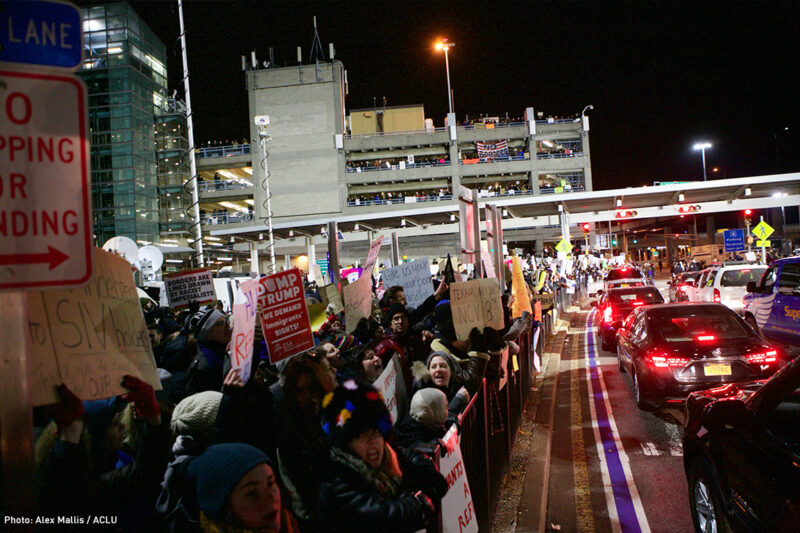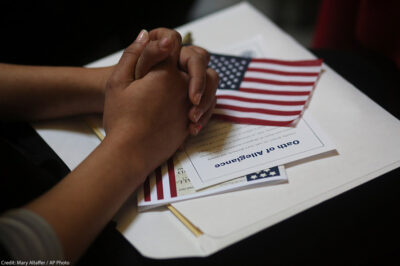
This piece originally appeared at .
If a Muslim Ban is cleaned up to exclude Iraq, exempt lawful permanent residents and other current visa holders, is it still a Muslim ban?
ThatŌĆÖs the question presented by President Donald TrumpŌĆÖs decision to replace his original executive order, enjoined by the courts, with a new one. The administrationŌĆÖs decision to abandon the old order is wise ŌĆö every judge but one who had reviewed it found it raised grave constitutional concerns. The new order will be less catastrophic in its roll-out than the first, both because it exempts those who already have visas and because it will not go into effect until March 16. But itŌĆÖs still religious discrimination in the pretextual guise of national security. And itŌĆÖs still unconstitutional.
As IŌĆÖve , Donald Trump has repeatedly made crystal clear his intent to ban Muslims from entering the United States. As a candidate, he repeatedly stated that he intended, if elected, to ban Muslim immigrants from entering the United States. He has never repudiated that commitment. When confronted with the fact that his proposal would violate the Constitution, President Trump said on "Meet the Press" on July 24, 2016, that he would use territory as a proxy for religion. And, when asked after his election victory whether he still intended to ban Muslim immigrants from the United States, President-elect Trump that was still the plan. Two days after the original executive order was issued, former New York City Mayor Rudy Giuliani, an advisor to President Trump, that then-candidate Trump had asked him for help in ŌĆ£legallyŌĆØ creating a ŌĆ£Muslim banŌĆØ; that, in response, Mr. Giuliani and others decided to use territory as a proxy; and that this idea is reflected in the signed order. There is overwhelming evidence that the most recent executive order was likewise intended to discriminate against Muslims.
First, it continues to target only countries that are predominantly Muslim. All of the six countries targeted for the immigration ban are over 90 percent Muslim. Second, it does so without a valid security justification. TrumpŌĆÖs own Department of Homeland Security that an individualŌĆÖs ŌĆ£country of citizenship is unlikely to be a reliable indicator of potential terrorist activityŌĆØ and that ŌĆ£few of the impacted countries [under the EO] have terrorist groups that threaten the West.ŌĆØ Third, on February 21, White House advisor Stephen Miller that any changes to the first executive order would be ŌĆ£mostly minor, technical differencesŌĆ”.Fundamentally, you are still going to have the same, basic policy outcome for the country.ŌĆØ Exempting lawful permanent residents and others with visas does nothing to alter the purpose or design of disfavoring a specific religion.
So the new executive order is, like the old executive order, intended to target Muslims. That intent violates the first principle of the Establishment Clause, which the government from singling out particular religions for favor or disfavor. The fact that the government has repackaged the ban does not alter its intent or effect ŌĆö to target members of a particular religion. And the purported national security justifications for doing so have been refuted by none other than the DHS itself.
The executive order has other flaws as well.
It maintains the first executive orderŌĆÖs unilateral reduction of the annual limit on refugee admissions from 110,000 to 50,000. That reduction, imposed unilaterally by the president without consultation with Congress, is unauthorized. The immigration statute does not allow the president to order a mid-year reduction in the level of refugee admissions ŌĆö which no president has ever done before ŌĆö much less to do so without consulting Congress. To the contrary, it states expressly that ŌĆ£number of refugees who may be admittedŌĆØ in a particular fiscal year ŌĆ£shall be such number as the President determines, before the beginning of the fiscal year and after appropriate consultation, is justified by humanitarian concerns or is otherwise in the national interest.ŌĆØ
The Republicans objected strenuously to President ObamaŌĆÖs allegedly unilateral decision not to prioritize the deportation of certain undocumented people here. But President Obama was exercising prosecutorial discretion expressly granted to him. In unilaterally cutting the refugee cap, at a time of virtually unprecedented world need for refugee placements, President Trump is not only acting unilaterally but in violation of the statute that establishes the process for setting the cap in the first place.
President Trump, weŌĆÖll see you in court.
To stand up to the rising tide of religious bigotry, our shareable describe what to do if you or someone you know experiences anti-Muslim discrimination.



